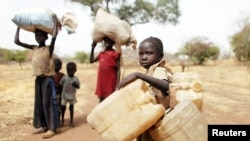The United States has welcomed the start on Wednesday of talks between Khartoum and opposition movements in Darfur, Southern Kordofan and Blue Nile, calling the negotiations a "critical step" in ending years of conflict in Sudan.
In a statement released jointly with the United Kingdom and Norway, the U.S. State Department urged the parties to the talks being held in Addis Ababa to "show their commitment to peace" by agreeing to a "synchronized cessation of hostilities" in the three troubled parts of Sudan.
The statement also urged the warring sides to allow humanitarian assistance to get through to people in war-affected areas, expressing concern over "the dire humanitarian conditions" in the Sudanese regions.
Sudan says ceasefire talks already begun
Sudanese Information Minister Ahmed Bilal told South Sudan in Focus that negotiations to reach a ceasefire in Blue Nile state and Southern Kordofan have already begun at the talks in Addis Ababa.
He called on rebel fighters in Darfur and the other two war-torn regions to lay down their weapons and engage in dialogue to try to end more than three years of war in Blue Nile and Southern Kordofan, and more than a decade of fighting in Darfur.
But even as the peace talks got under way in Addis Ababa, officials in Khartoum were announcing "...plans for major military offensives" in Southern Kordofan and Blue Nile, said the statement released by the United States, United Kingdom and Norway, which together make up Sudan troika.
The three countries expressed alarm at the saber-rattling by the Sudanese government and warned that "...these conflicts cannot be won militarily. Further offensives only serve to increase the human suffering of the civilians in these areas."
Sudanese political analyst Haj Hamad urged the United States to put pressure on Sudan to agree to a humanitarian ceasefire in the war-torn regions to "at least... give civilians a window of opportunity to restock their food."
He said the government in Khartoum is "using food as a weapon and refusing a partial ceasefire."
Marginalized by Khartoum
Fighting erupted in the Nuba Mountains in Southern Kordofan, and in Blue Nile in 2011, the year South Sudan voted overwhelmingly to break free of Khartoum's rule and become an independent country. Communities in Blue Nile and Southern Kordofan were aligned with the southern rebels during Sudan’s 22-year civil war, which ended with the signing of a comprehensive peace agreement in 2005.
The war in Darfur has been raging for more than a decade. The United Nations has estimated that at least 300,000 people have died since fighting broke out in Darfur in 2003. Khartoum has said the death toll is closer to 10,000.
Both conflicts started in part because the local populations felt marginalized by the government in Khartoum.
Human Rights Watch has said indiscriminate bombings in the Nuba Mountains and abuses of civilians, which it blames on Khartoum, may constitute war crimes.
And in a report released last year, the International Crisis Group said that unless Khartoum and rebel groups fighting it "engage each other and, with international help, negotiate a comprehensive solution to Sudan’s multiple conflicts, there will be no stop to endless wars that plague the country."





